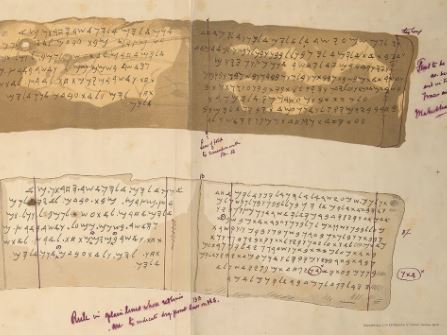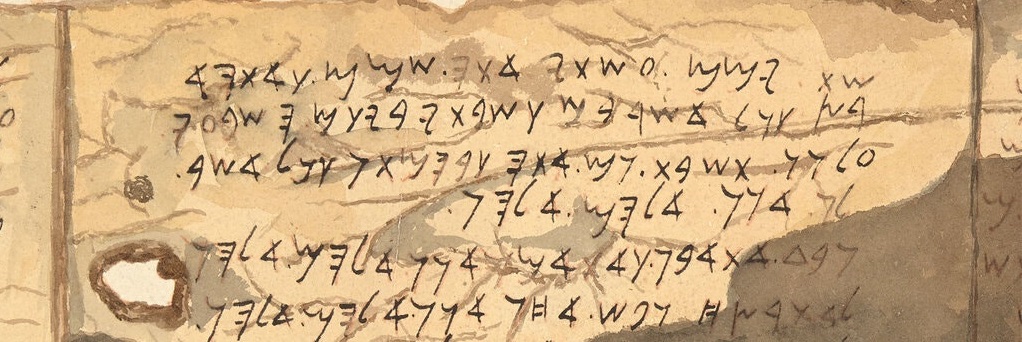REVIEW: The Book of Moses and the Shapiro Scroll

The recent appearance of The Valediction of Moses by Prof. Idan Dershowitz of Harvard University gained widespread attention in the popular press worldwide – an unusual feat for a work of biblical scholarship published by an academic press. In brief, Dershowitz claims that a scroll containing passages of Deuteronomy, discovered near the Dead Sea in the 19th century and long regarded as a famous forgery, is in fact an authentic copy and the oldest extant biblical text. But, Dershowitz’s dating of Deuteronomy to the First Temple period raises questions for traditional belief in the book’s origins in the final period of the Israelite’s desert wandering. While rejecting Dershowitz’s theory, R. Yoel Bin-Nun helps us make sense of the matter…
The personal tragedy of Moses Wilhelm Shapira (1830-1884), who first abandoned his Judaism through conversion, and ultimately gave up his life to suicide, has opened a window to a tragedy in the world of Biblical studies through an ancient scroll containing sections of the Book of Deuteronomy, purported to have been discovered near the Dead Sea, and written in language which apparently dates the scrolls to the time of the First Temple. The original scroll disappeared and was lost because it was declared a forgery in the 1880s through the exaggerated self-confidence of distinguished researchers at the time. Perhaps the most important lesson of this whole story is the need for care and humility in biblical research, as with all fields of science, and certainly in life generally.
Prof. Idan Dershowitz’s recent book, The Valediction of Moses: A Proto-Biblical Book (Mohr Siebeck), calls into question the conventional wisdom that the scrolls were forgeries. Through philological analysis of parts of the scroll he attempts to establish their approximate dating to the First Temple period. With that, we note that as a careful scholar he cannot definitively establish the period of King Josiah (7th century BCE) as the date for the composition of Deuteronomy, specifically not the legal sections of the book (which lead to the “revolutionary” abolition of bamot), or to other biblical books written in the style of or influenced by of Deuteronomy, such as Joshua, Kings, and Jeremiah.

Fragments found near the Dead Sea in 1883 were thought to be an alternate version of Deuteronomy (credit: The British Library)
One of the vexing challenges of biblical studies is the substitution of the conclusions of research for “theologies,” which cause any who deny or even question them from within academia to be outcast as an unlearned boor. Many questions I have raised over the years about accepted “truths” of scholarship have been met with arrogant dismissal. Articles I authored were rejected on the grounds that they did not meet the criteria of academic referee procedure – ironically, in ways similar to the dismissal from the right-wing Torah community concerning biblical criticism.
Dershowitz’s main thesis, breaking with academic convention up to this point, is the original “Book of Moses” contained mainly the narrative sections of Deuteronomy, without the long legal sections outlining the mitzvot. He assumes that the narrative contained in the Shapira scroll is nothing other than a “way-station” in the development of the Deuteronomy text as we possess it today. “Someone,” according to Dershowitz, inserted the legal sections between the covenant on Mounts Gerizim and Ebal in chapter 11 and the reappearance of those mountains in chapter 27.
In my view, the historical picture is the exact opposite. In the First Temple period many books and scrolls were copied containing sections and passages from the Torah, in the same way that we copy biblical texts on parchment and scrolls as tefillin and mezuzot. In ancient Hebrew each such copied section would have been called a “sefer” (book). If it contained the description of the covenant, the section of blessings and curses, it may have even been titled the “Book of the Covenant” (a la Exodus 24) or “Sefer Torah” (Deuteronomy 25).
This is precisely the case of the Torah scroll found in the Temple in the days of Josiah: it contained the blessings and curses and account of the covenant from Deuteronomy (chaps. 27-28). On this account Josiah rent his garment: Would any man who hears Deuteronomy rediscovered anew—either the narrative or legal passages—not rend his clothes?
Similarly at the Hakhel ceremony, in which the Israelites are commanded to read “this Torah” (Deut. 31:11), they did not read from Genesis to the end, nor even all of Deuteronomy itself, but rather the Ten Commandments and the passages of Shema, the holidays, and the rule of the Kings, and most importantly the blessings and curses. Until the era of Ezra the entire Torah scroll was never read from as part of the public liturgy. When needed, the relevant passages were read from individual scrolls containing the appropriate text.
Therefore, books and scrolls containing parts of Deuteronomy or other Torah portions do not constitute stages in some editorial or textual progression of the book as a whole (an axiomatic assumption which has never been proven), but were rather copies of select passages from an extant whole biblical text. Admittedly, this is also an unproven hypothesis, but one which has evidentiary support from the known practices of Hakhel from a “Sefer Torah” consisting only of sections of the whole text, principally the blessings and curses, and from the example of tefillin and mezuzot found until this very day in Jewish homes everywhere.
Despite the fact that I completely reject the foundational assumptions and conclusions of biblical scholars, especially those who advance theories about the “evolution” of the biblical text, I embrace the position and path of Rav Kook, and agree with Idan Dershowitz that we can reject no person and are obligated to make room in our community for those who observe the mitzvot, and read the Torah, even if they possess opinions which differ from ours in matters of scholarship and faith.
Rabbi Dr. Yoel Bin-Nun is a well-known teacher and writer on issues of Jewish thought and biblical scholarship.
